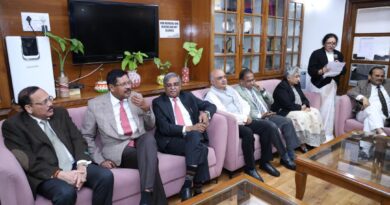Supreme Court Criticizes Mumbai College for Imposing Hijab, Burqa Dress Code Restrictions
(Judicial Quest News Network)
New Delhi 10, August,2024
On Friday, the Supreme Court of India issued a stay on a directive from NG Acharya and DK Marathe College in Mumbai that prohibited Muslim women students from wearing the Hijab or other religious symbols on campus.
Justices Sanjiv Khanna and Sanjay Kumar, who were hearing the matter, challenged the college’s policy by questioning its rationale. Justice Khanna asked, “Will you also ban students from wearing a bindi or a tilak?” He emphasized that students should have the freedom to study and interact together without restrictions based on religious attire. Justice Kumar further interrogated the college’s claim that the ban aimed to promote equality and minimize religious distinctions. He asked, “Will students’ religious identities be concealed, with everyone identified only by numbers?”
The college, represented by Senior Advocate Madhavi Deewan, defended the directive as a means to maintain an equitable academic environment. However, the bench questioned whether the college had recently recognized the country’s religious diversity, suggesting that the institution’s stance might be out of touch with India’s pluralistic society.
The case was brought before the Supreme Court by Zainab Abdul Qayyum Chaudhari and other Muslim students challenging a Bombay High Court ruling from June 26, which had upheld the college’s dress code policy. This issue follows a broader national debate over the wearing of Hijabs in educational settings, which had previously reached the Supreme Court in a related case from Karnataka.
During proceedings, the Court highlighted that female students must have the freedom to choose their attire, and such bans on religious clothing could not be enforced. Concerns were raised about the college’s selective acknowledgment of religious diversity, especially regarding whether similar restrictions would apply to other religious symbols like the tilak and bindi.
While the Court affirmed the importance of religious expression, it also specified that burqas should not be worn inside classrooms and that religious activities should be prohibited on campus. The Justices warned that the interim order should not be misused and granted the educational institution the right to appeal if they believe the order is being exploited.
Senior Advocate Colin Gonsalves, representing the petitioners, argued that the ban had prevented students from attending classes and receiving attendance, noting that some students had worn the Hijab for four years. In contrast, Senior Advocate Madhavi Deewan contended that there were 441 Muslim girls at the college, with only three requesting to wear the Hijab. She argued that such attire could create barriers to interaction among students.
Justice Khanna responded by stating that educational institutions should not impose restrictions that undermine students’ autonomy, suggesting that proper education should address these issues. He acknowledged that while burqas might not be practical in classrooms, the broader question of autonomy and religious expression must be considered.
The dispute arose after nine students challenged a new dress code notice from NG Acharya and DK Marathe College, which was set to be implemented for the new academic year beginning in June. The Bombay High Court had dismissed the plea, supporting the college’s aim to prevent religious distinctions and ensure a focus on education. The Supreme Court, however, scrutinized whether the college had the authority to impose such restrictions and whether the policy violated Article 15 of the Indian Constitution, which prohibits discrimination based on religion.
The Court emphasized that wearing a Hijab, niqab, or burqa does not disrupt educational processes or create unfair advantages, and the ban could foster a hostile environment for Muslim female students.
The petition was drafted by Advcoate Hamza Lakdawala and filed through Advcoate Abiha Zaidi.




